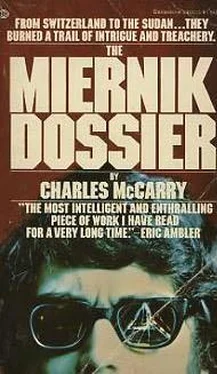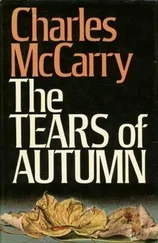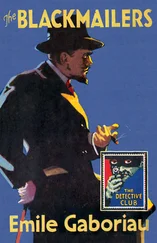This leads to the conclusion that the victim was murdered, probably by an assailant who approached and sprayed cyanide into Tanner’s face from extremely close range.
A similar method has been used twice in the past year. The victims were the leader of a Polish émigré group in Munich (18 October) and a young woman in Berlin (11 January) who was suspected of being engaged in espionage activities.
Tanner’s dossier shows a history of contacts with known representatives of foreign intelligence services. (See secret files.)
It is assumed that this crime was politically motivated. No information of any kind relating to this crime is to be made available to the press, which has already reported that an unidentified man died of natural causes in the Prater on the relevant date.
44. NOTATION BY THE AMERICAN STATION IN GENEVA.
Records of the Swiss federal police indicate that Tadeusz Miernik was absent from Switzerland last October 17-18 and on January 11. In both cases he reentered the country by train.
Christopher reports Miernik was absent from his hotel from midnight until at least 0130 on 19 June, the date of Tanner’s death.
Vienna is asked to withhold this information from its Austrian police liaison for the time being.
45. REPORT BY CHRISTOPHER.
21 June. Journal of the Miernik Expedition (cont’d): We rose at five and were on the road by six. Through most of the morning it was a silent ride, partly because of the gray weather, partly because of the strain created by Zofia’s presence. Collins does not like having her along, and he is not one to conceal his emotions. He is now barely civil to any of us.
We arrived in Innsbruck in time for lunch. After the meal, Kalash and Miernik went off to find a cuckoo clock for some relative of Kalash’s, and Zofia and I went for a walk through the town while Collins stayed with the car. Zofia was subdued; I don’t know whether it’s a reaction to the excitement of the other night, or whether she’s disturbed by Collins’ hostility. We passed a music shop and I took her inside and bought her a guitar. She was delighted by the gift and kept the instrument with her when we got back in the car. As we climbed toward the Brenner, she played a little and the Polish songs brought a smile to Miernik’s lips. Even Collins softened a little and asked for a couple of songs.
There was still a lot of snow beside the road at the top of the pass. We stopped at the summit and walked around shivering in our summer clothes. It was a brilliant day at that altitude, with the Dolomites rising through the clouds to the south. Kalash got out his camera and posed us all against the snowy backdrop. Miernik moved as the shutter clicked, then volunteered to take a shot of all of us with Kalash. Collins said, “Miernik, why do you always jump about when your picture is being taken? Kalash has a whole roll of film showing one American, one Englishman, and a Polish blur.”
There was difficulty at the Italian frontier over Miernik’s passport. The commandante of the border post was puzzled that Miernik should have been given a thirty-day visa on a passport that expires in eleven days’ time. Moreover, he does not like Polish passports. He examined every page of the little brown book and subjected Miernik to an hour of questions. It was all very polite, but Miernik was in that state of acute distress which any contact with men in uniform seems to produce in him. It was hard to blame the Italian for being suspicious. Zofia, it turns out, is traveling on an Ecuadorian passport. (This document may well be genuine; it shows her true name and actual date and place of birth; no doubt Kirnov has an obliging friend in some Ecuadorian consulate.) Kalash, too, is a rare bird to appear at an Alpine outpost, and both Collins’ passport and mine are filled with suspicious visas and stamps. By any standards, we are a peculiar group.
Kalash saved the situation in the end. He did not mind the wait (he has told me that he has no sense of time, a quality he regards as one more proof that he is a wiser and happier man than any white who grew up surrounded by clocks) but he saw that the rest of us were getting impatient. He strode into the customs post and we saw him through the window, talking to the Italian while Miernik fidgeted in the background. I thought he might try bribery, and I had a picture of all of us languishing in some damp jail in Bolzano.
Then we saw the commandante smile, nod, and sit down at his desk. He scribbled for a moment in Miernik’s passport and banged away at it with his rubber stamps. Miernik and Kalash emerged. “That man is a bureaucrat,” Kalash explained. “He needed a way to cover his tracks, but of course he hasn’t the imagination to invent a solution. I told him to cancel Miernik’s thirty-day visa and substitute one that expires when the passport expires. A great light broke in his brain, as perhaps you saw through the window. So we can go, taking this dangerous Communist along with us. I think I have a great future in diplomacy. Ambassador to some Christian country. It’s good for the mind to deal with the Catholics, they are so eager to be honorable. If that man had been an Arab, we could have given him some money and avoided all this bother. But where would the intellectual challenge have been?” He patted the roof of the car, as if rewarding a willing beast. “The Cadillac had a good deal to do with it as well,” he said. “Had we arrived on motorcycles, old Miernik would be in chains. A policeman always reckons that if one has money enough to buy a big car, one has money enough to buy a bigger policeman. He hesitates to trifle with a Cadillac. A Rolls-Royce would have been just as frightening in your palmy days, Nigel. No more, alas.”
“Such foolishness,” Miernik said, stamping around in the road, flourishing his passport. “If I were a spy I would not be coming into Italy on a Polish passport. Spies have American passports. He actually searched my sling for concealed weapons or maybe microfilm. I could not reason with him.”
Kalash pushed Miernik into the car and shut the door. “You really must speak to Miernik,” he said. “I found him talking Latin to that Italian. The man speaks perfectly good English. He asked me why Miernik was speaking Romanian if he was a Pole. Really, I’m surprised Miernik didn’t unpack his rosaries and wave them about. Latin. I ask you, Paul. He suffers from intellectual egomania.” As is his habit when he is overcome by disgust, Kalash went promptly to sleep in the back seat. I drove down the mountain, a good deal slower than Kalash had driven up the other side.
We arrived in Verona in the late afternoon. Miernik, of course, had all the Baedeker details. He took us on a walking tour of the city, ending in a grubby little courtyard in which is located, according to the tourist guides, the balcony of Juliet. Miernik denounced it as a fake. Kalash picked up Zofia and tossed her onto the balcony, which is not far above ground level. Then, standing with one hand on his heart, he recited Othello’s death speech.
“That’s the wrong play, Kalash,” Miernik said.
“I know it is, you bloody pedant. I never played Romeo at Oxford, at least not on stage. It’s a foolish play in any case, all Shakespeare’s plays are very foolish. People killing themselves for sex-an Italian might, I suppose. But a Moor? I rather like that line about taking the circumcised dog by the throat, though. My ancestors were certainly put off by all that English foreskin. Made the fairies among ’em shudder. Autre pays, autres mœurs. ”
We walked on to the Albergo Due Torre for supper. The atmosphere seemed gay enough when we entered-music, dancing; eager waiters: Italy is the last outpost of cordiality. We ordered food and wine and sat back to enjoy the scene. At the next table was a party of Germans. One of them, a blond type in a coat with a belted back, rose and bowed to an Italian female child at the adjoining table. He called for a waltz and danced with the little girl, who must have been about eight years old. His companions, another man and two middle-aged women, laughed in delight. The German took the child back to her parents and thanked her with another deep bow. Then he sent her a big pink drink full of fruit, and bowed again, clicking his heels. Miernik watched coldly (as did all of us except Kalash), and Zofia stared fixedly at her wineglass. The Germans wore that air of racial superiority which some of them seem to think is the correct attitude for a traveler south of the Alps. It was apparent that they had been officers at one time, and they spoke Italian. “Waffen SS,” Collins murmured, “returning to the happy scenes of wartime duty.”
Читать дальше












